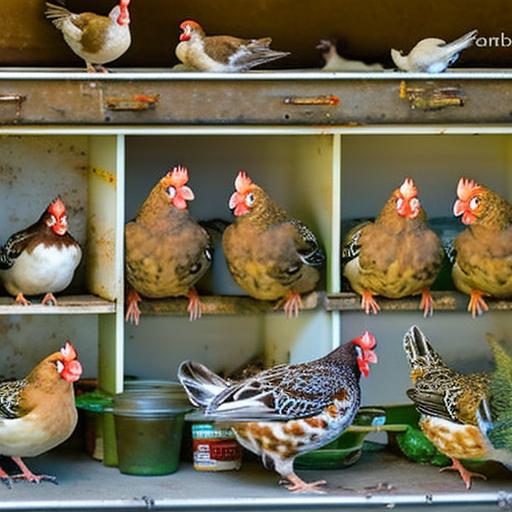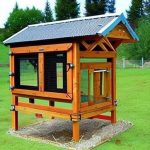Keeping chickens in a garage may seem like an unconventional idea, but it can actually be a practical and rewarding way to raise chickens. There are several benefits to keeping chickens in a garage, such as protection from predators and weather conditions. Additionally, having fresh eggs readily available can be a convenient and cost-effective option for many people. However, there are also legal considerations and factors to consider before embarking on this endeavor. In this article, we will explore the benefits and considerations of keeping chickens in a garage, as well as provide guidance on how to prepare the garage and choose the right chicken coop.
Key Takeaways
- Keeping chickens in a garage can provide fresh eggs and a fun hobby.
- Legal considerations, such as zoning laws and permits, must be researched before starting.
- Factors to consider include space, ventilation, and noise levels.
- Preparing the garage involves cleaning, insulation, and adding necessary equipment.
- Choosing the right coop and design considerations are important for the chickens’ health and safety.
Benefits of Keeping Chickens in a Garage
One of the main advantages of keeping chickens in a garage is the protection it provides from predators. Chickens are vulnerable to attacks from predators such as raccoons, foxes, and even neighborhood dogs. By keeping them in a secure garage, you can greatly reduce the risk of these attacks. Additionally, a garage provides shelter from extreme weather conditions such as heavy rain, snow, or extreme heat. This can help keep your chickens safe and comfortable throughout the year.
Another benefit of keeping chickens in a garage is the convenience of having fresh eggs readily available. Instead of having to go to the grocery store or local farm to buy eggs, you can simply walk into your garage and collect fresh eggs from your own flock. This can save you time and money in the long run. Furthermore, raising your own chickens allows you to have control over their diet and living conditions, ensuring that you are getting high-quality eggs that are free from antibiotics or other additives.
Legal Considerations for Keeping Chickens in a Garage
Before deciding to keep chickens in a garage, it is important to research and understand the legal requirements in your area. Zoning laws and regulations vary from place to place, so it is crucial to check with your local government or municipality to determine if keeping chickens in a garage is allowed. Some areas may require permits or have specific guidelines that need to be followed.
Not following the legal regulations for keeping chickens in a garage can have consequences. You may face fines or other penalties if you are found to be in violation of the law. Additionally, if your neighbors are not supportive of your decision to keep chickens, it could lead to conflicts and strained relationships. It is important to be a responsible and considerate neighbor when keeping chickens in a residential area.
Factors to Consider Before Keeping Chickens in a Garage
Before bringing chickens into your garage, there are several factors that should be considered. One of the most important factors is space. Chickens need enough space to move around comfortably and engage in natural behaviors such as scratching and dust bathing. A garage should have enough room to accommodate the number of chickens you plan to keep.
Ventilation is another crucial factor to consider. Proper ventilation is essential for maintaining good air quality and preventing the buildup of ammonia from chicken droppings. Without adequate ventilation, your chickens may suffer from respiratory issues or other health problems. It is important to ensure that your garage has windows or vents that can be opened to allow for fresh air circulation.
Additionally, it is important to research and choose the right breed of chicken for garage keeping. Some breeds are better suited for confinement and can tolerate being kept indoors for longer periods of time. Others may become stressed or exhibit behavioral issues if they do not have access to outdoor space. It is important to choose a breed that will thrive in the environment you can provide.
Preparing the Garage for Chicken Keeping
Before bringing chickens into your garage, it is important to thoroughly clean and disinfect the space. Remove any items that could pose a danger to the chickens, such as chemicals or sharp objects. Sweep or vacuum the floor to remove any dust or debris, and then wash the floor with a mild detergent or disinfectant. Allow the space to dry completely before introducing the chickens.
In addition to cleaning, it is important to provide adequate lighting and ventilation in the garage. Chickens need natural light to maintain their circadian rhythm and lay eggs consistently. If your garage does not have windows or access to natural light, you may need to install artificial lighting to simulate daylight hours. Additionally, ensure that there are windows or vents that can be opened to allow for fresh air circulation.
Choosing the Right Chicken Coop for Garage Keeping

When it comes to choosing a chicken coop for garage keeping, there are several options to consider. One option is a mobile coop, which can be easily moved around the garage to provide fresh grazing areas for the chickens. This allows them to have access to different areas of the garage and prevents them from becoming bored or stressed.
Another option is a stationary coop, which is fixed in one location within the garage. This type of coop is typically larger and provides more space for the chickens to move around. It may also have additional features such as nesting boxes and roosting bars. The size of the coop should be determined by the number of chickens you plan to keep, ensuring that each chicken has enough space.
Chicken Coop Design Considerations for Garage Keeping
When designing or choosing a chicken coop for garage keeping, there are several considerations to keep in mind. One important consideration is ease of cleaning. The coop should have removable trays or floors that can be easily cleaned and sanitized. This will help prevent the buildup of droppings and reduce the risk of disease.
Access to food and water is another important design consideration. The coop should have easily accessible feeders and waterers that can be filled and cleaned without having to enter the coop itself. This will make it easier for you to provide food and water for your chickens on a daily basis.
Additionally, the coop should have adequate roosting space and nesting boxes. Chickens need a comfortable and secure place to roost at night, as well as private nesting boxes where they can lay their eggs. The coop should also have enough ventilation to ensure good air quality and prevent the buildup of ammonia.
Building a Chicken Coop for Garage Keeping: A Step-by-Step Guide
If you decide to build your own chicken coop for garage keeping, here is a step-by-step guide to help you get started:
1. Determine the size of the coop based on the number of chickens you plan to keep. Each chicken should have at least 4 square feet of space.
2. Gather the necessary materials, such as wood, screws, wire mesh, and roofing materials.
3. Build the frame of the coop using the wood and screws. Make sure it is sturdy and secure.
4. Attach the wire mesh to the frame to create walls and a roof. This will keep the chickens safe from predators while still allowing for ventilation.
5. Install roosting bars and nesting boxes inside the coop. Make sure they are secure and comfortable for the chickens.
6. Add a door or hatch for easy access to the coop. This will make it easier for you to clean and maintain the coop.
7. Install windows or vents for ventilation. This will help maintain good air quality inside the coop.
8. Add bedding material such as straw or wood shavings to the floor of the coop. This will provide a comfortable surface for the chickens and help absorb moisture.
Maintenance and Upkeep of a Chicken Coop in a Garage
Once you have set up your chicken coop in the garage, it is important to regularly maintain and clean it to ensure the health and well-being of your chickens. Cleaning should be done on a regular basis to remove droppings and prevent the buildup of ammonia.
Start by removing any soiled bedding and replacing it with fresh bedding. This will help keep the coop clean and prevent odors. Additionally, clean and disinfect the coop on a regular basis to prevent the spread of disease. Use a mild detergent or disinfectant and scrub all surfaces thoroughly. Rinse with clean water and allow the coop to dry completely before adding fresh bedding.
It is also important to regularly check for signs of pests such as mites or lice. These parasites can cause discomfort and health issues for your chickens. If you notice any signs of infestation, take appropriate measures to treat the chickens and eliminate the pests from the coop.
Is Keeping Chickens in a Garage Right for You?
Keeping chickens in a garage can be a practical and rewarding way to raise chickens, but it is important to carefully consider whether this practice is right for you and your specific situation. The benefits of keeping chickens in a garage include protection from predators, convenience of having fresh eggs readily available, and control over the chickens’ diet and living conditions.
However, there are legal considerations that need to be taken into account, as well as factors such as space and ventilation. It is important to research and understand the legal requirements in your area before deciding to keep chickens in a garage. Additionally, ensure that your garage has enough space and proper ventilation to accommodate the number of chickens you plan to keep.
Preparing the garage for chicken keeping involves cleaning and disinfecting the space, as well as providing adequate lighting and ventilation. Choosing the right chicken coop is also crucial, as it will provide shelter and security for your chickens. Consider factors such as ease of cleaning, access to food and water, and roosting space when designing or choosing a chicken coop.
Once the coop is set up, regular maintenance and cleaning are necessary to ensure the health and well-being of your chickens. This includes removing soiled bedding, cleaning and disinfecting the coop, and checking for signs of pests.
In conclusion, keeping chickens in a garage can be a rewarding and practical way to raise chickens. However, it is important to carefully consider the benefits and considerations before embarking on this endeavor. By doing so, you can ensure that you are providing a safe and comfortable environment for your chickens while enjoying the benefits of fresh eggs and the joy of raising your own flock.
If you’re considering keeping chickens in your garage, it’s important to provide them with a suitable living environment. One crucial aspect is the flooring of the chicken coop. To learn more about the best options for the floor of your chicken coop, check out this informative article on Poultry Wizard: https://poultrywizard.com/keeping-chickens/floor-of-chicken-coop/. It provides valuable insights and tips on how to create a comfortable and hygienic space for your feathered friends.
FAQs
Can I keep chickens in my garage?
Yes, you can keep chickens in your garage, but there are certain things you need to consider before doing so.
What are the things I need to consider before keeping chickens in my garage?
You need to consider the space, ventilation, lighting, temperature, and cleanliness of your garage. Chickens need enough space to move around, good ventilation to prevent respiratory problems, proper lighting to lay eggs, and a temperature between 50-80°F. You also need to keep your garage clean to prevent the spread of diseases.
What kind of chickens can I keep in my garage?
You can keep any breed of chicken in your garage, but it’s best to choose breeds that are suitable for indoor living. Bantam breeds are a good choice because they are smaller and require less space.
Do I need a permit to keep chickens in my garage?
It depends on your local laws and regulations. Some cities and towns require permits for keeping chickens, while others don’t. Check with your local government to see if you need a permit.
What do I feed my chickens if they are kept in my garage?
You can feed your chickens the same food you would give them if they were kept outside. Chickens need a balanced diet of grains, protein, and vitamins. You can buy chicken feed at your local feed store or online.
Can I keep roosters in my garage?
It’s not recommended to keep roosters in your garage because they can be noisy and may disturb your neighbors. Roosters are also not necessary for egg production, so it’s best to stick with hens.
Meet Walter, the feathered-friend fanatic of Florida! Nestled in the sunshine state, Walter struts through life with his feathered companions, clucking his way to happiness. With a coop that’s fancier than a five-star hotel, he’s the Don Juan of the chicken world. When he’s not teaching his hens to do the cha-cha, you’ll find him in a heated debate with his prized rooster, Sir Clucks-a-Lot. Walter’s poultry passion is no yolk; he’s the sunny-side-up guy you never knew you needed in your flock of friends!







